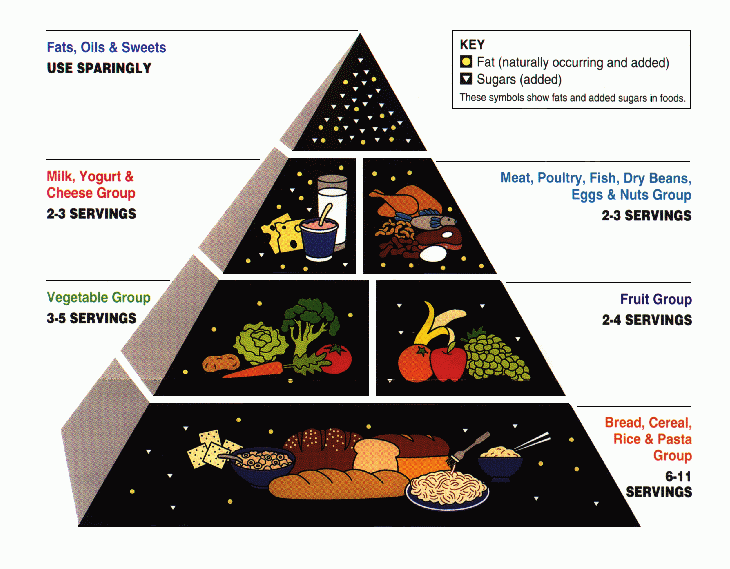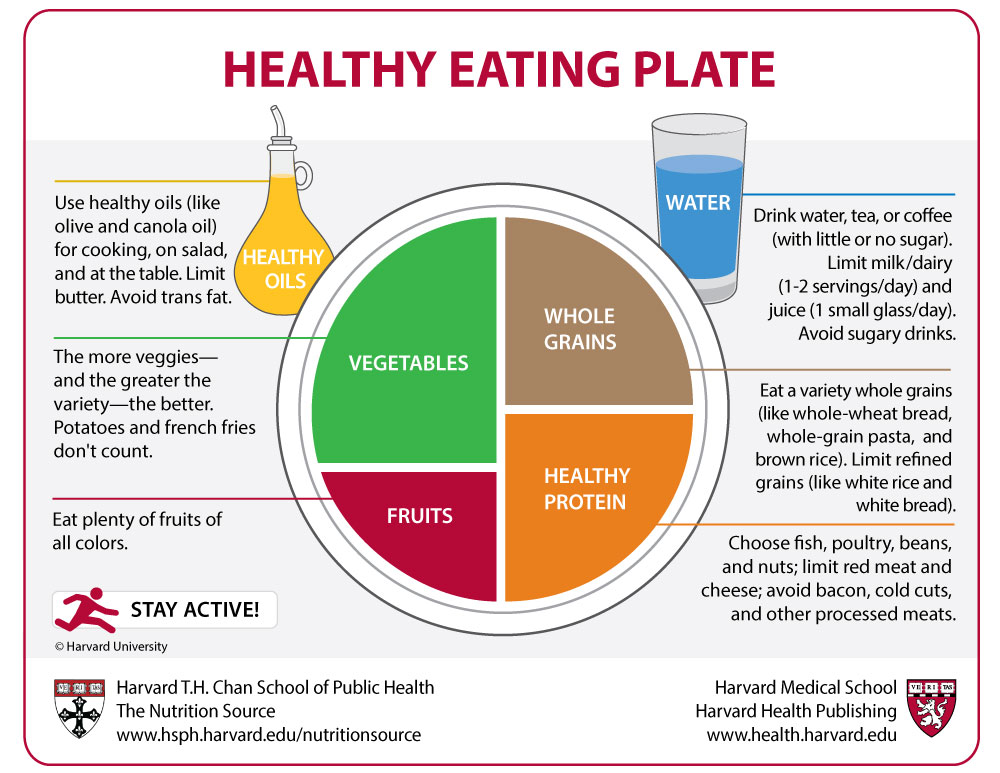Why The Food Pyramid Was Always Flawed
Jun 03, 2025
Can you do me a favor please.
If you see where the month of May has gone, can you tell me? 🫠
When you're busy working on a business you love, time seems to whizz past!
Like seriously, I'd be open to a 9-10 day week, seven just isn't enough 😂
It's easy to let your health slip when life gets busy. In my experience, one of the first things to go is nutrition.
But the last thing you want to do is fuel your body poorly, but modern living has made that all too easy to do.
So, in today’s email, I want to discuss one of the biggest issues I have with nutrition today.
The Flawed Food Pyramid
Recognise this bad boy?

Of course you do.
The now-infamous food pyramid was on the wall of every classroom and doctor's office for decades.
It first came about in Sweden in the 1970s and was adapted by the U.S Department of Agriculture (USDA) in 1992.
One would assume that it was around this time that it made its way into the UK & Ireland.
The food pyramid was flawed from the get-go for one major reason.
It placed carbohydrates right at the bottom of the pyramid, recommending 6–11 servings per day.
Fats were relegated to the top, to be used sparingly.
The issue here is that it failed to distinguish between refined and whole grains or between harmful and beneficial fats.
As a result, it inadvertently encouraged high consumption of refined carbs, such as white bread, pasta, and breakfast cereals.
It's no coincidence that since the food pyramid was introduced, obesity rates in the US have doubled!
It's not the sole cause, but it certainly contributed to spikes in obesity and type 2 diabetes.
Dietary Fat Is Essential, Carbs Aren’t
Your body can survive without carbohydrates.
It can't, however, say the same about dietary fat.
A diet devoid of essential fats will eventually lead to health complications and early death.
A study by The Lancet of 135,000 adults found that those who cut back on fats had much shorter lives than those enjoying butter, cheeses and meats.
Fats are essential for the human body as they:
- Provide a concentrated source of energy
- Aid in vitamin absorption
- Support cell growth
- Contribute to hormone production and brain health
Even though higher in calories than carbohydrates, fat needs to play an integral role in everyone’s nutrition plan, so the above can be avoided.
The pyramid’s emphasis on reducing all fats ignored the health benefits of unsaturated fats found in foods like nuts, seeds, oily fish, and olive oil.
One of the other sticks used to beat fat with was the idea that certain high-fat foods increased cholesterol levels. Eggs are the main culprit.
I'll discuss this in another email, but this is one of the biggest myths around and has been proven false in recent years.
Cholesterol is actually very good for you and is essential for excellent health.
Most of the cholesterol we eat is not absorbed and is excreted by our gut (via a poop).
Eating cholesterol has very little impact on the cholesterol levels in your body.
Back when the pyramid was first introduced, there was a fight against dietary fat.
This fight wasn't backed by science, but rather the pyramid’s recommendations were influenced by agricultural interests, rather than purely scientific evidence.
In recent years, evidence emerged that the sugar industry had paid scientists in the 1960s to implicate saturated fat, and not sugar, as a cause for heart disease.
Shock horror. Money and corruption had a part to play in the obesity epidemic 🙃
I'm a huge fan of carbs and eat my fair share each day, but it's important to remember that they are not essential.
Recent Changes Don't Cut It
To their credit, both the UK and the US governments have seen the error of their ways and have taken measures to rectify the mistakes of the food pyramid.
In 2011, the US introduced 'MyPlate', with the UK introducing the 'Eatwell Guide' in 2016.

Now, I would look at these as marked improvements on the pyramids, but they're not without their flaws.
For instance, the UK still seems reluctant to push the importance of protein, despite the real impact it has on overall health and wellbeing.
Carbs easily outweigh protein by at least 2:1.
The US seem to have done a better job in their redesign, but again, it's not without its flaws.
I would like to see them advise on how much protein a person should eat and why. Even though they mention using healthy fats, they only mention it with canola and olive oil.
What about the healthy oils found in nuts & oily fish?
This is another clear indication that they're not ready to admit how important fat is in a healthy diet.
So even though there is clearly a marked improvement, I still don't think it's up to scratch.
Besides, both of these countries are continuing to get unhealthier and fatter year after year, so clearly something isn't right from a nutrition perspective.
A Modern Approach
Given the shortcomings of past dietary guidelines, I would opt for:
✅ Lean Proteins (Complete, High-Quality Protein Sources): These are foods that provide all nine essential amino acids your body can’t make on its own. Examples:
- Poultry (chicken, turkey)
- Fish (salmon, cod, sardines)
- Eggs
- Dairy (Greek yoghurt, cottage cheese)
- Lean red meats (beef, pork, lamb)
Aim to eat 1.2-2g of protein per KG of lean body weight. For an 80kg man with 20% body fat, that would be between 77-128g of protein daily. If your goal is to build muscle, which I strongly advise it is, then aim for the higher number.
✅ A solid supply of healthy fats, specifically monounsaturated and polyunsaturated fats as these are proven to be beneficial for overall health. Examples:
- Extra virgin olive oil
- Fatty fish
- Nuts
- Seeds
- Avocado
Avoid 'low fat' foods as more often than not it's gone through a processing process that has most likely involved adding sugar to the product.
I'd much rather have fat in my diet than sugar.
✅ Dietary Fibre: Consuming whole grains, fruits, and vegetables supports digestive health and helps regulate blood sugar levels. If you're someone who struggles with their fibre levels, then psyllium husk can be very beneficial.
✅ Complex carbs used strategically: Primarily around workouts to fuel performance and aid recovery. These slow-release carbs won't spike your insulin levels like refined carbs such as white bread do. You'll receive a slower release of energy, enabling you to perform at high intensities.
Carbs help me lift heavier and get better pumps in the gym, helping me build muscle and strength. These are two very important aspects of longevity.
This approach prioritises muscle maintenance, metabolic health, and long-term energy, while avoiding the blood sugar crashes and inflammation often driven by refined carbs and poor-quality fats.
It also follows the principles of the Mediterranean diet, which has been associated with reduced risks of chronic diseases and improved overall health. Just with some added carbs for maximum training performances.
I'm not pretending to know it all and I'm in no way suggesting that this is the 'perfect' way to go, but it's definitely better than most of the nutrition mumbo jumbo you read.
This is simply what I do and it works for me. I feel good, energetic, and I'm nice and lean.
Nutrition is very much an individual sport and it's important that you find what works for you, but hopefully this email has helped clear up a few things.
Catch you next time,
Mark
My coaching program, The Paradigm Project, helps ambitious entrepreneurs, c-suites, & business owners live a healthier, stronger, and all-around better life.
Most importantly, one of the main aims of the program is to help every single client achieve pain-free performance!
If you are in the mood to transform your health & fitness, then life-changing results are within your reach.
Click on the link to apply for coaching & we can build a plan that changes your life!
Quote for the day
"Life is a succession of lessons which must be lived to be understood." -
Ralph Waldo Emerson
P.S. Whenever you’re ready, here are a few ways I can help you:
- Are you an ambitious entrepreneur or professional who wants to get strong, lean, and boost your energy? Then find out more about my 1-1 coaching here.
- Grab a FREE copy of my Ultimate Health Guide by Clicking here now.
Disclaimer: This newsletter is for educational and informational purposes only. It is not intended to provide medical advice, diagnosis, or treatment. Any guidance related to training, nutrition, supplementation, or lifestyle is general in nature and not a substitute for personalised medical advice. Always consult with a qualified healthcare professional before making changes to your health routine.




